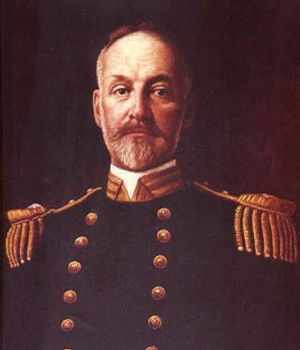

RAdm. William Sowden Sims.
Born 15 October 1858 at Port Hope, Ontario, Canada, he was appointed to the Naval Academy from Pennsylvania in 1876 and was graduated in 1880. Seventeen years of sea duty were followed by assignments as Naval Attaché to Paris, St. Petersburg, and Madrid. Sims next served as Inspector of Target Practice; and, under his supervision, the naval gunnery system increased the rapidity of hits 100 percent and the general effectiveness of fire 500 percent. He also served as Naval Aide to President Theodore Roosevelt for two and one-half years.
On 11 February 1917, Sims became President of the Naval War College. In March 1917, he was designated by the Secretary of the Navy as Representative of the Navy Department in London. With the entry of the United States into World War I in April, he assumed command of all American destroyers, tenders, and auxiliaries operating from British bases. In May, he was designated as Commander of United States Destroyers Operating from British Bases, with the rank of vice admiral; and, in June, his title was changed to Commander, United States Naval Forces Operating in European Waters. On 10 December 1917, he assumed additional duty as Naval Attaché, London, England. Commander of U.S. Naval Forces in European waters during World War I, he adopted the use of naval convoys and promoted the construction of destroyers to counter Germany’s use of unrestricted submarine warfare. The North Sea Mine Barrage was laid under his direction.
Admiral Sims again became President of the Naval War College in April 1919 and served in that capacity until his retirement on 15 October 1922. His book on Anglo-American naval cooperation in the war at sea during World War I, Victory at Sea, won the Pulitzer Prize in history in 1920. He died at Boston on 25 September 1936.
Source: Naval War College and Surface Navy Association